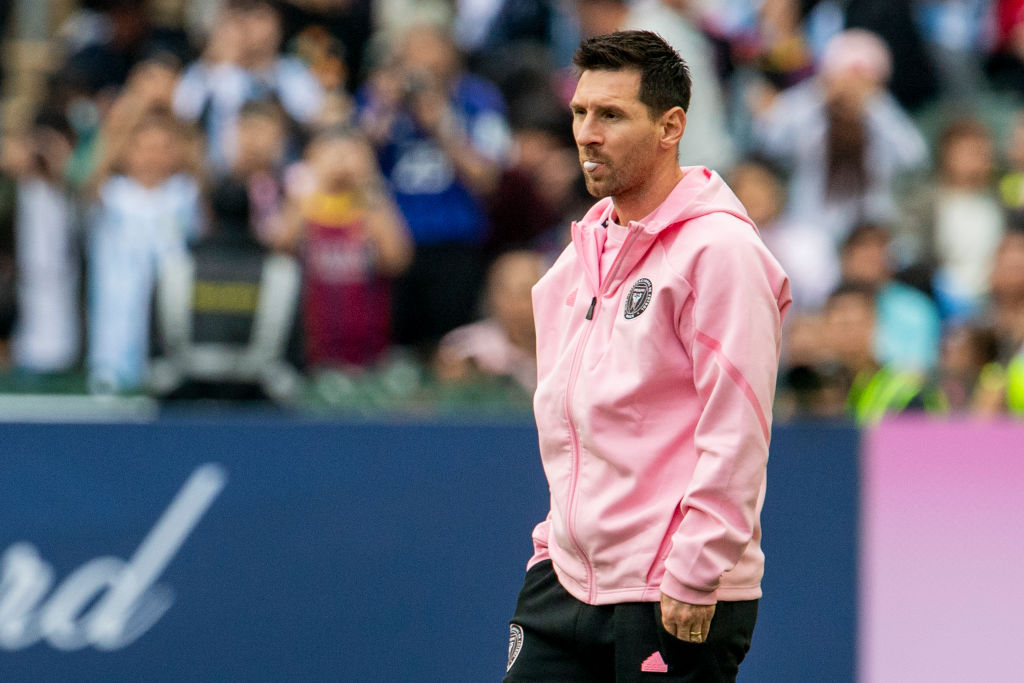
Lionel Messi sought to draw a line under controversy about his failure to play in a football match in Hong Kong earlier this month, saying his absence wasn’t due to political reasons and he has great affection for China.
In a video statement released on Chinese social media late Monday, the Inter Miami star said he wanted to set the record straight after hearing he didn’t play because of politics and “many other reasons.” These are “totally untrue,” he said, reiterating his absence was due to an inflamed adductor.
Read More: Why Hong Kong Is Mad Over Messi
“Since the start of my career, I’ve had a very close and special relationship with China,” said Messi, who faced the camera wearing a gray T shirt in the 140-second video. “I’ve done lots of things in China — interviews, games and events. I’ve also been there and played many times.”
He concluded the English and Chinese-subtitled video saying: “As always, I send good wishes to everyone in China, who I’ve always had, and continue to have, special affection for. I hope to see you again soon.”
This is at least the third time Messi, 36, has explained why he didn’t play in the Feb. 4 exhibition match, after a press conference in Tokyo and a written statement published on China’s Weibo social media platform. Both Messi and Inter Miami co-owner David Beckham were booed by the crowd in Hong Kong.
Messi’s absence in the game, and his participation in a match in Japan just days later, fueled speculation he was deliberately snubbing fans in Hong Kong and mainland China. The Global Times, a Chinese nationalist tabloid, said in an editorial that Messi failed to apologize and the impact of the incident “far exceeded the realm of sports.”
Read More: The Backlash to ‘Messi’s Mess’ in Hong Kong—and How It Could Backfire on the City
Chinese sporting authorities canceled planned friendly games between Argentina and Nigeria as well as Ivory Coast in the wake of the saga.
Hong Kong politicians also weighed in, with Regina Ip saying the Argentine World Cup winner should be banned from the city because of his “lies and hypocrisy”. The organizer of the Hong Kong match meanwhile said it would issue a 50% refund to ticket holders worth $7.2 million because of Messi’s no-show.
There are signs that Messi’s latest statement may calm the waters. Hu Xijin, the former editor in chief of Global Times who earlier led criticism of the footballing legend, said in a post on X that Messi’s “attitude seemed sincere” in the video and he personally accepts the explanation.
Yet, he said, Messi will pay a price in terms of a damaged image in China.
Messi’s appeal to China follows a well-trodden path for celebrities perceived to have wronged the nation.
In 2014, Kenny G drew criticism from Beijing after he posed with pro-democracy protesters in Hong Kong. The musician quickly disassociated himself from the protests, saying he cared about China deeply. In 2021, Jamie Dimon, JPMorgan Chase & Co.’s chief executive officer, issued a statement of regret after quipping that his bank was likely to outlast China’s Communist Party. The same year, professional wrestler and actor John Cena apologized in Mandarin for calling Taiwan a country.
More Must-Reads from TIME
- Cybersecurity Experts Are Sounding the Alarm on DOGE
- Meet the 2025 Women of the Year
- The Harsh Truth About Disability Inclusion
- Why Do More Young Adults Have Cancer?
- Colman Domingo Leads With Radical Love
- How to Get Better at Doing Things Alone
- Michelle Zauner Stares Down the Darkness
Contact us at letters@time.com